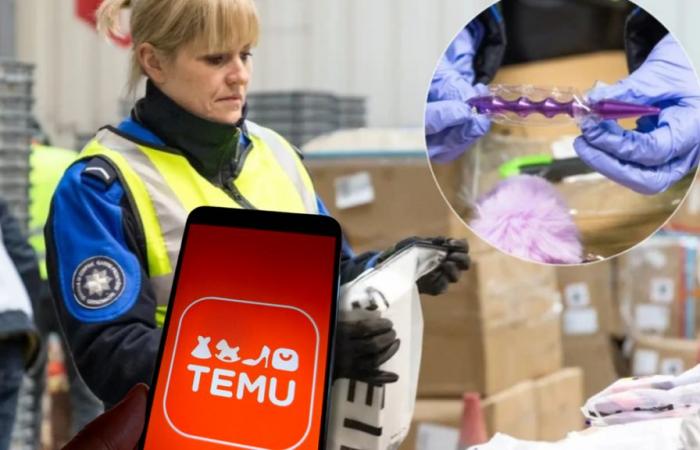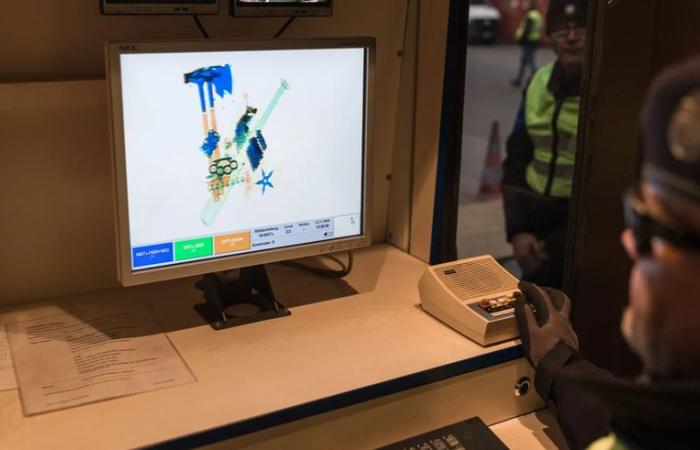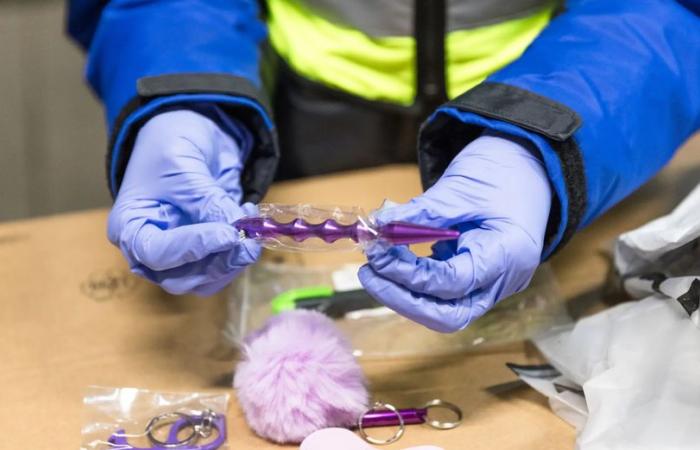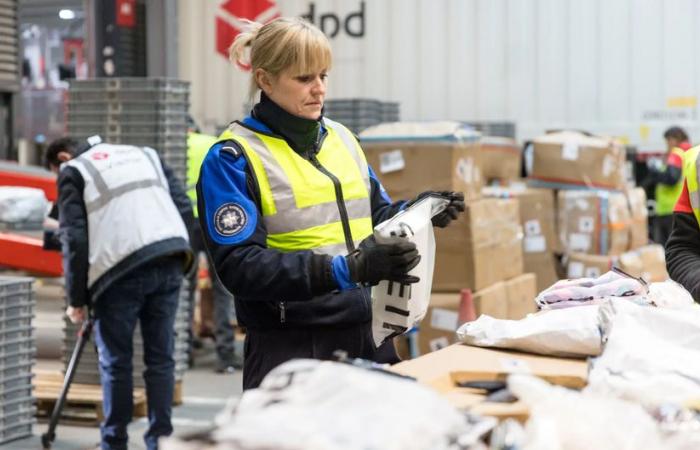Asian online stores are flooding the Swiss market not only with cheap products, but also with illegal products. How do customs officers search for suspicious packages?
Andreas Maurer and Sandra Ardizzone / ch media
The largest logistics center of the shipping company DPD in Switzerland is located in an industrial hall in Buchs (ZH). 80,000 packages pass through the conveyor belts every day. New trucks arrive all the time, most of them coming directly from Zurich-Kloten Airport.
But today, in the lobby, it’s not “business as usual.” Customs officers in blue uniforms and yellow fluorescent vests set up a checkpoint in front of the conveyor belts. At ten sites in total, they are simultaneously carrying out the largest control of goods traffic in the history of Swiss customs. Forty people are mobilized for five days.
Image: Sandra Ardizzone
So many packages arrive in Switzerland by air that controls at the airport would hamper traffic. This is why customs decentralizes its searches for illegal shipments in the logistics centers of transport companies.
Customs are responding to the mail-order boom by emphasizing controls. During the pandemic, even people who usually preferred to shop in stores discovered the benefits of shopping online. At the same time, platforms from Asia have expanded their offering and accelerated their transport chains.
Since then, platforms like Temu, Shein or Wish have flooded the Swiss market not only with cheap products, but also with illegal products. Everything can be ordered with one click: illegal weapons, doping, impotence medications, drugs or exotic products like shark liver oil. With Black Friday on November 29, the high season for online commerce begins again and will last until Christmas.
Made in China: this merchandise is suspect
A gray bus is parked at the edge of the hall. Inside, a customs officer sits in front of his screen. Every second, new x-rays appear. He uses it to watch the shipments his colleagues pass through a conveyor belt into his vehicle.
The customs officer in the gray van sifts through the goods.Image: Sandra Ardizzone
They blocked the shipment of pallets containing suspicious shipments and are now checking whether the suspicions were founded. For reasons of investigative tactics, they do not want to reveal the criteria by which they spot the packages. The table of seized objects, however, gives a clue: most are “made in China”.
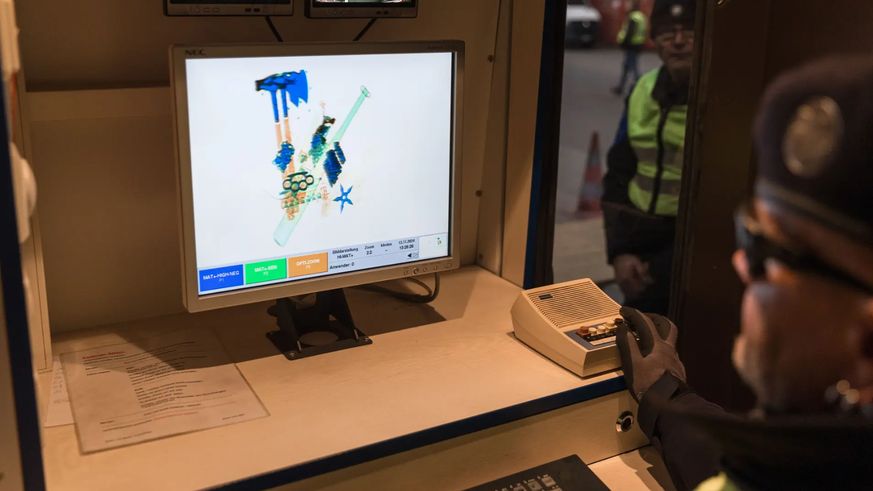
X-rays per second: brass knuckles, throwing star, ax and bat.Image: Sandra Ardizzone
The color on x-rays only reveals the material. The customs officer in front of the screen sees plastic objects. When little green dots appear, he says, “Those are cheap rhinestones.” Plastic beads. Then he discovers bottles:
“It could be a performance-enhancing drug, or a Chinese facial cream”
A DPD employee cuts the packaging. For insurance reasons, customs cannot do this themselves. False alarm: it’s just beauty products. She glues everything back together and sends it back on its way to transport via a conveyor belt.
A weapon for women
But now a metal bar appears on the screen. At first glance, this sending also seems harmless. These are several key rings, specially designed for female customers. All of them are lilac in color, one of them is covered with plush.
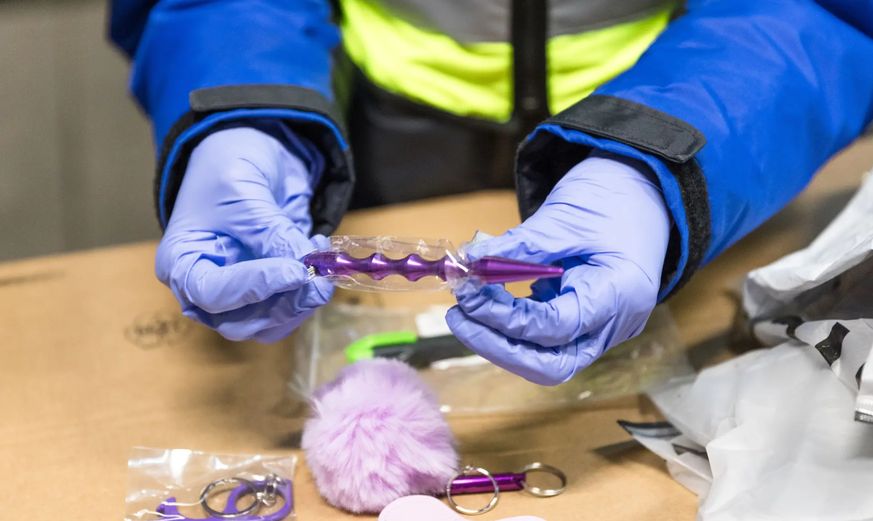
New gadget for women: a kubotan, an illegal bladed weapon on a key ring.Image: Sandra Ardizzone
The prohibited object is not recognizable as such to the uninitiated: it is a little longer than a ballpoint pen, ends in a point at the front and has four grooves in the center for a firm grip . It’s a kubotan.
“This is a dangerous trend,” points out Tanja Brunner, head of Zurich customs. She is the one who runs the operation. Kubotans now represent the majority of weapons seizedas shown by the targeted control.
The inventor and the one who gave his name to the weapon is the Japanese Takayuki Kubota in the 1960s. He developed this bladed weapon for the Los Angeles police officers. Various Asian martial arts disciplines additionally use it as a pressure point amplifier. The fighters thus learn which points of the opponent’s body they must hit and for which injuries.
A kubotan is no more dangerous than a screwdriver or scissors. What is decisive is the use made of it. According to Swiss law, a weapon is a device intended to injure people, unlike a tool. This is why some knives are prohibited, others not. And that’s why kubotan is also banned. Its only goal is to hurt.
In online commerce, kubotans are certainly mainly touted for self-defense. Unlike pepper spray, women can hold this device discreetly in their hand and thus strike by surprise, say the advertising texts. With a targeted blow, it can incapacitate physically superior opponents. Pepper sprays, which contain only pepper, on the other hand do not leave wounds and are therefore available in specialized stores from 18 years of age without a weapons license.
Kubotan is synonymous with the rearmament of nightlife. Young men have more and more folding knives in their pockets. Young women sometimes have one of these metal pens hanging on their set of keys.
Customs complains about lack of staff
During the inspection, customs will find almost 700 shipments containing illegal goods. They contain, among other things, 241 drugs, 79 weapons and 71 laser pointers. Added to this are 543 counterfeit brands as incidental catches. For all categories mentioned, one country tops the list of origins: China.
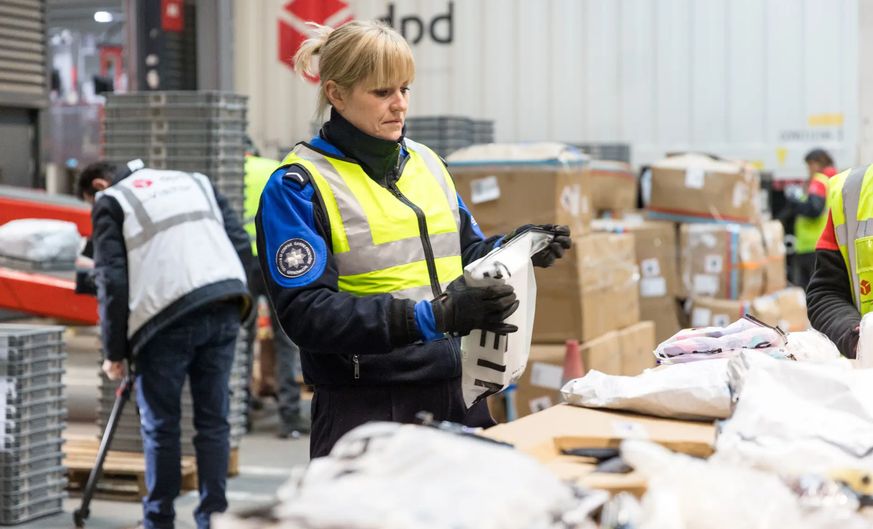
Illegal? A customs officer at work.Image: Sandra Ardizzone
In a multi-year comparison, customs notes fluctuating figures. One year, for example, more weapons are seized, the following year a little less. However, this data does not say much about online commerce, but rather about the situation of customs personnel.
He who seeks finds. During the years when the number of cases declined, the federal Customs and Border Security Office lacked resources to screen packages.
Behind many illegal shipments, however, there is no bad intention. Customs chief Brunner recognizes this:
“It is sometimes difficult for customers to know if they are ordering prohibited products”
Its team searched for illegal products on relevant online platforms to adjust the focus of priority screening, and found many misleading indications in product descriptions. For kubotans, for example, it is often stated that they are not weapons, even under Swiss law.
But ignorance does not protect against sanctions. Customs confiscates the goods and sends them to the cantonal public prosecutors. For the authorities, parcel checks have become a mass affair. The major cantonal public prosecutor’s offices issue criminal orders on this subject almost daily. These are accelerated procedure judgments in which investigators also act as judges.
“I will never order from Wish again”
A criminal order from the Aargau public prosecutor’s office has just come into force. Hans S. (name changed), a 52-year-old from Aargau, ordered an air pistol and three telescopic batons via the Wish app. Wish is an American sales platform that mainly sells Chinese products at low prices.
Zurich customs confiscated the air pistol because it is considered an imitation weapon. It is prohibited because it can be confused with a real firearm. As for batons, these are prohibited weapons that can only be purchased with an import permit.
The prosecution imposed a monetary penalty of 40 days fine of 30 francs, firm. If the man does not pay the 1200 francs, he will have to spend 40 days in prison. Added to this are 2,380 francs in procedural costs.
Hans S. is thus financially ruined. He lives on an AI pension of 900 francs and pays his fine in installments. The order had only cost 100 francs:
“I ordered the gun as a gift for my little boy, the sticks for training. I practice martial arts.
In addition, he is a hunter and therefore has a weapons permit, but not for batons.
On the sales platform, the products were presented as legal. Hans S. learned lessons from this affair:
“I will never order anything on Wish again”
Translated and adapted by Chiara Lecca

